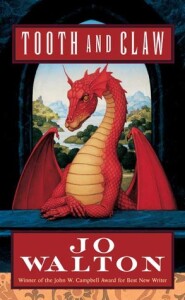 Jessica Paige penned this review.
Jessica Paige penned this review.
I love this book. Usually in a review I attempt to be both fair and balanced, but you, dear reader, should know beforehand that Tooth and Claw is a book of the kind I want to buy all my friends who might enjoy it their very own copy, so they can experience the complete joy of reading it (straight to a gossip session about the characters), and because I don’t want to risk losing my own copy. If there was a fire and I could only save twenty of my books, Jo Walton’s Tooth and Claw would probably make the cut.
So, I’ll try to be fair and balanced in this review, but you’ve been fairly warned about my leanings toward “gush.” That out of the way, I’ll attempt to restore confidence in the “balance” goal this reviewer has by stating clearly that this book is not for everybody. The reasoning there is in no part due to a flaw in the book — indeed, there were none, except for a few minor typos. It is due to the matter of tastes.
At first look, I was pretty sure I’d just been saddled (and take a moment to consider how exquisitely painful a saddle would be on a human back) with a book that I not only wouldn’t have glanced at the store, but that was most decidedly not my style.
This is the short catch-phrase inside the jacket: “A tale of love and contention — among dragons.” Skeptical? I was. Dragons have never greatly appealed, and really, how many variations on talking dragons could there be? I’m not particularly a fan of the talking animal variety of novel at all, to tell the truth. Furthermore, upon reading down on the dust-jacket the words “family” and “political” both jumped out at me. Do you not think of a shadow of Zelazny’s Amber family, where they’re all dragons and trapped together in one place? I do. On the other end of the spectrum, I thought that Tooth and Claw might read like Patricia C. Wrede’s The Enchanted Forest books — minus every character who wasn’t a dragon and scraping a good dose of the humor into a wastebasket to make the whole thing more serious.
From the very first pages, I knew I was wrong. Consistently one of Tooth and Claw‘s impressive traits is its depiction of a society of dragons. As a base, Ms. Walton clearly took Victorian England, but her world is distinct and lives completely on its own. All the details necessary to the characters’ interactions in their world — and all the details necessary to the readers interaction with their world and the characters — are invisibly presented. Not even once did I stop to think, oh, now she tells us, isn’t that convenient or yes, yes, now get on with the story.
Companion to this accomplishment: the dragons are not humans. They are dragons; but it feels impossible to doubt the authenticity of their humanity. You see, they are people too. Thank you, Anthony Trollope, for inspiring such wonder. Never was there any impatience in learning about their society — and never was there any impatience with a switch from character point-of-view to character point-of-view. This wasn’t even because I cared for one storyline over another or because by the end of a chapter the characters involved had come to any kind of closure. Usually, that was not the case. It was because my curiosity and desire to see things turn out well was equally invested in each character. Of course, there was desire to see comeuppance for the bad ones — but I wasn’t sure that they would get it. And that feeling of uncertainty, that promise of surprise, feels important in a genre where the conflicts and plots often feel like rote — especially when the uncertainty is also comfortable.
Tooth and Claw is not an epic. The fate of the world does not rest in one dragon’s claws. No great houses rise and fall (per se). No sweeping societal change that undoes injustice is affected after righteous speeches and great and terrible difficulties have culminated in the end of a novel. If that’s what you’re looking for, this book is not for you. There are moments of adventure and violence — after all, the name of the book is Tooth and Claw — but nothing great is lost or won.
Now, if the words “Victorian England” have set off warning bells, and you’re still reading, this book probably isn’t for you. The issues raised and some of the devices used are very clearly lifted from Victorian novels. While I’ve heard claimed that Anthony Trollope-like novels can move slowly, I just didn’t find that to be the case. Still, the novel revolves around the happenings of one family and their various interactions with foes, friends and acquaintances. If that’s not your cup of tea, look no further.
In Tooth and Claw, Jo Walton has threaded sincerity, humanity, thoroughness, taut pacing and a sometimes wry humor that truly made me feel good and smile. Closing the book after reading the last sentence and lingering over it a while, has me suffused in a happy glow. I want to share that — so go, do yourself a favor, and even if you’re wavering on whether or not this sounds good to you, just go. Take a look. Try the book.
(Tor, 2003)
